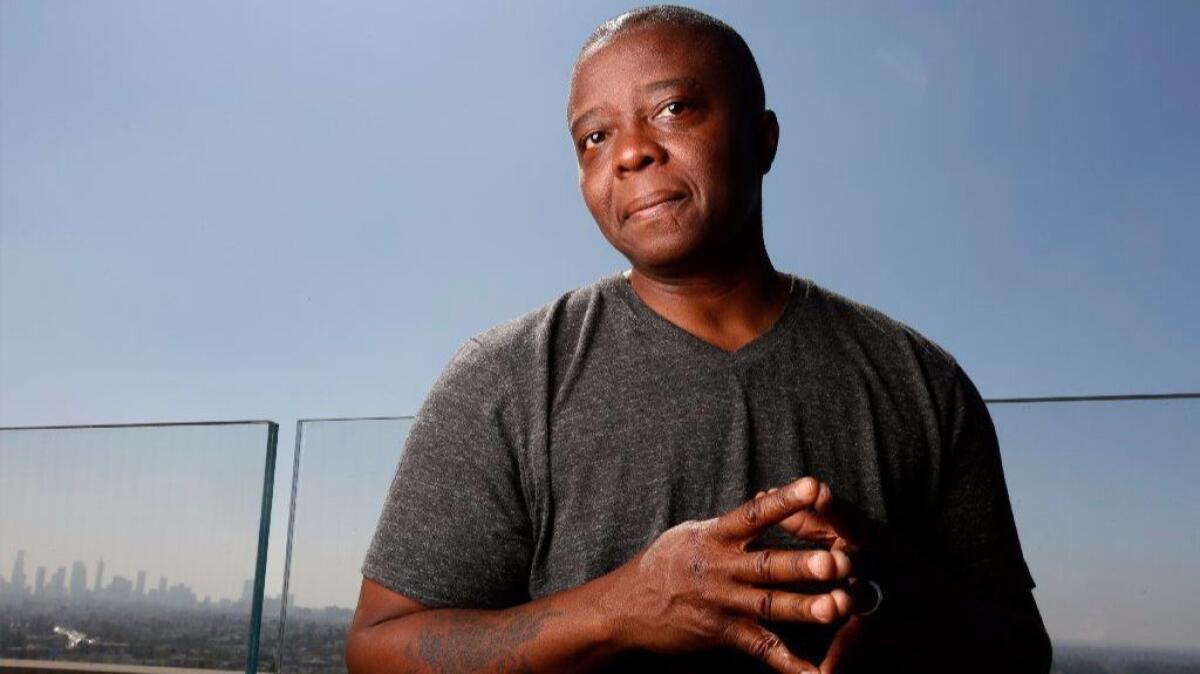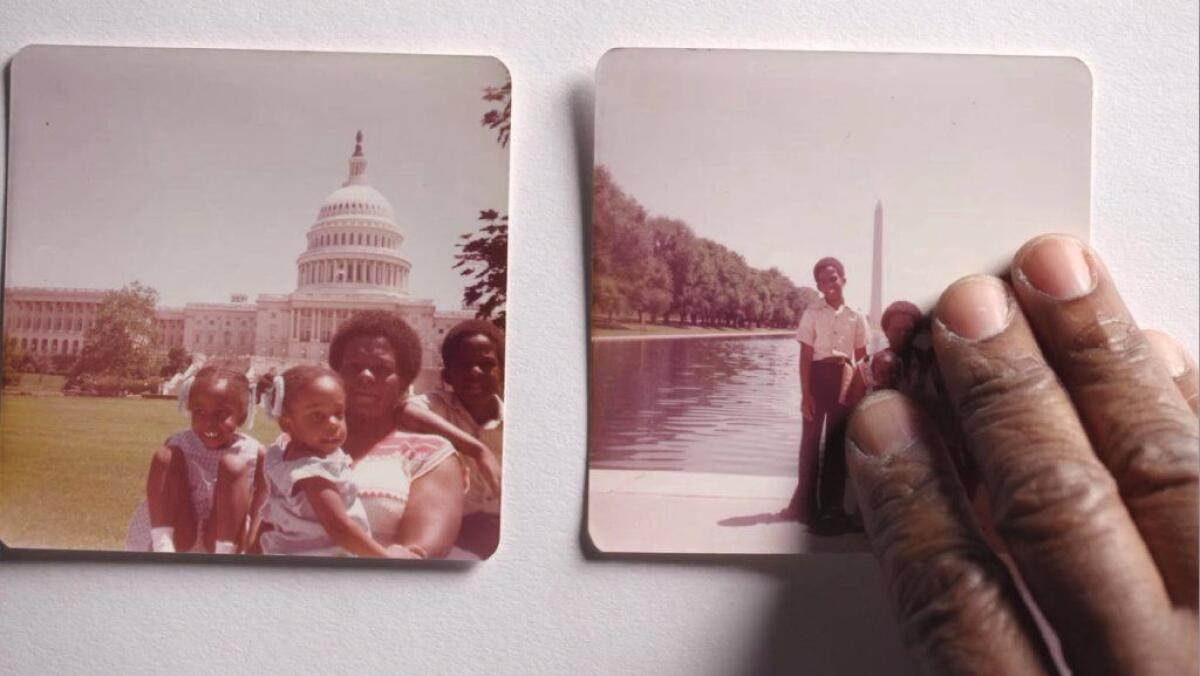Q&A: Yance Ford’s ‘Strong Island’ asks white people to ‘interrogate their fear’ of black bodies

- Share via
Life for Yance Ford and his family was “normal” before 1992.
As one of three kids, he and his brother and sister were just your everyday Gen-X, latchkey kids in Long Island, N.Y., who would come home from school with dinner already on the stove and do their homework. Their father had already left to go to his night job as an MTA motorman and mom, a high school principal, was on her way home. Their house was full of love and acceptance.
“Then everything sort of exploded when William died,” Ford said.
In April 1992, Ford’s brother, then a 24-year-old teacher, was killed by a white 19-year-old mechanic. Though the city’s police investigated the case, the shooting was deemed justifiable by a grand jury and the shooter never faced any consequences. William was unarmed.
“Everyone’s life [in my family] got picked up and put down in a place that was completely unfamiliar,” said Ford, who was 19 and a student at Hamilton College at the time, “and essentially the criminal justice system said ‘good luck’ and walked away.”
This was a time long before social media campaigns and cellphones, but Ford’s family and community used whatever means at their disposal — petitions, letters, phone calls — to seek justice.
“Once the community exhausted all of its resources, we were supposed to go back to regular life,” Ford continued. “But regular life isn’t regular after something like this.”
A year after William’s death, their father had a stroke. He died three years later, leaving “my mom, sister and I to spend 20 years living with the death of my brother in which he was made complicit,” Ford said. An “inevitable shadow of grief and loss” set in over the family, as well as countless unanswered questions about how justice had evaded them.
Ford now has answers, 25 years later, as shown in the documentary “Strong Island,” screening at Santa Monica’s Monica Film Center and streaming on Netflix beginning today.
The film, which won a special jury prize at Sundance, charts Ford’s journey to reconnect with the officers and prosecutors involved in his brother’s case and discover how the grand jury could have made its decision. Featuring emotional interviews with Ford’s mother and sister, it’s an intimate meditation of how a family’s personal tragedy is situated in an institutionalized fear of blackness and how a loved one’s unexplainable death has enduring impact decades later.
Ahead of the film’s release, The Times spoke with Ford — who during the interview was announced as the International Documentary Assn.’s emerging documentary filmmaker of the year — about his brother, the 10 years it took to make the film and what “Strong Island” adds to the recent slate of similarly themed films about the criminal justice system.
Why explore your brother’s death through film?
I was an art student when William was killed and started putting his death into my work. Thankfully it was art student-level work and I hadn’t thought about making a film, though I knew I would still continue to work with it. In 2006, after doing a workshop at a nonprofit in New York — and I had been working at [PBS’ documentary series] “POV” for four years watching films — the weight of the silence around my brother’s death was growing. I decided it was time.
A friend and mentor asked me, when I finally told her I had a brother and he had been murdered, what I had been waiting for. I didn’t have an answer. That’s when I started.
It was a 10-year process. How was it discovering the information revealed in the film and locating the investigators and prosecutors?
I used a private investigator to locate a lot of the people who had been involved, tangentially or not, with the case. Making the film involved two things. One was the easy part of asking my family to sit down and talk to me. The difficult part was making the phone calls, being afraid and knowing on some level that this wasn’t necessarily a fool’s errand. But I had to constantly check my expectations that people who had done a lackluster and half-hearted attempt to bring my brother’s case to trial would be — 15, 16, 17, 18 years later — interested in talking to me about it. The first phone call in the film demonstrates that.
It also involved a lot of time waiting for the phone to ring. It was a constant process of confronting my fear and then overcoming it. And I’m not typically a fearful person so to find myself in this dynamic again, which was just like the dynamic in 1992, is, I think, why the film has such an energy to it.
We are constantly interrogating the lives of the dead without interrogating the fear of the living.
— Yance Ford
Why did you decided to include yourself in the film?
I had a list of 10 rules when I first started. The first rule was “Yance will not be in the film.” We were shooting interviews and under director’s delusion I had told myself that we were just using audio. We got to the end of the long rough cut and I realized I only had one-third of the story. I didn’t have my sister or me, and I had my mother in her sadness but not her anger. When I took a step back — and because this isn’t the type of film you can do twice — I knew I had to get it right the first time and that I needed to re-approach the film. One of the first things my team and I did was watch the interviews. We all were very insistent, and I admitted, that my character could and should function as the connective tissue.
Who are the filmmakers you used as inspiration?
The entire canon of cutting-edge African American filmmakers like Julie Dash, Marlon Riggs, Isaac Julien, Spike [Lee] obviously. But also people like Chris Marker, Agnès Varda, Chantal Akerman and Patricio Guzmán, people who’ve taken their personals stories and used it to illuminate moments in history and make their stories larger than themselves.
That’s what I realized I needed to do with “Strong Island.” It could be just a film about my family or it could be a film about what's been happening in our country for generations. Those are the people who helped me see it needed to be larger and that it was my obligation to make it larger.
Your film is debuting at a time when so many pictures are about the criminal justice system. How is “Strong Island” different?
That so many films are on the circuit this year that have to do with these issues is fantastic because they all look at different aspects of the criminal justice system. With this collection of films, we have the system as a whole from policing to incarceration to present-day situations with violence against African Americans. What “Strong Island” does is bring a historical perspective and help people understand that what we’re treating as a modern-day phenomenon is actually not modern. It's actually quite old. We must begin to understand that these deaths are essentially points on a line. In my film and family that line begins in 1944 when my grandfather was allowed to suffocate in an emergency room, all the way through 2012 when I was in production and Trayvon Martin was shot, all the way through [the killings of] Michael Brown, Philando Castile, Renisha McBride …

“Strong Island” also has a civilian shooting. It’s important to remember that the instances of white civilians who kill African Americans are most often judged to be justifiable homicides. And I think we're in a dynamic where we’re only talking about police violence and we need to be talking about violence against African Americans period.
What do you want the audience to take away after watching?
It’s really simple because there isn’t a rhetorical question in the film. That final question in the film — how do you measure the distance of reasonable fear? — that's the takeaway. We are constantly interrogating the lives of the dead without interrogating the fear of the living. We have forgotten that the judicial standard is reasonable fear, not fear period. We have an obligation to interrogate that fear and determine if it’s reasonable. We have forgotten that obligation, and accepted lame excuses and frankly manufactured fear. That manufactured fear resulted in people who've committed crimes not going to trial. The takeaway is that you and I can't be the only ones who understand that fear of black people is irrational, historic and part of how people get away with murder. We need to interrogate this fear if anything is ever going to change. And, frankly, white people need to interrogate their fear because I know why my brother is dead.
With Netflix as the distributor, the whole world will know your brother’s story. What is the usefulness in that?
For as much as we are able to activate around families who lose loved ones, we must understand that the needs of these families are going to exceed the amount of time that we are able to pay attention to them, because there has always been the next shooting. In the United States, I hope the film can help activists understand that part of what needs to happen is, as everyone is talking about self-care as a present-tense thing, it needs to be something that lasts a lifetime, and especially for these families. I think about Trayvon Martin’s parents 20 years from now. What are they going to be like? What are they going to need?
I’ve also been all over the world with this film and I hear from people that it's like this case or that case or this case. When I was in the U.K. in June, a young man who was running away from a cop attempted to swallow something and in an attempt to prevent this person from doing harm to themselves, the cop tried to pull out whatever was in his throat and he choked to death. He died, on camera, on CCTV. It’s important to realize that these things are happening outside of the bubble of America — violence against people of color and ethnic minorities. Violence against the other, and the way we otherize people out of fear, has to be examined across the board.
For the record
10:45 a.m.: This article incorrectly listed artist Patricia Guzmán as one of Ford’s inspirations. One of his inspirations is filmmaker Patricio Guzmán.
This article was originally published at 5 a.m.
Sign up for Essential California
The most important California stories and recommendations in your inbox every morning.
You may occasionally receive promotional content from the Los Angeles Times.








